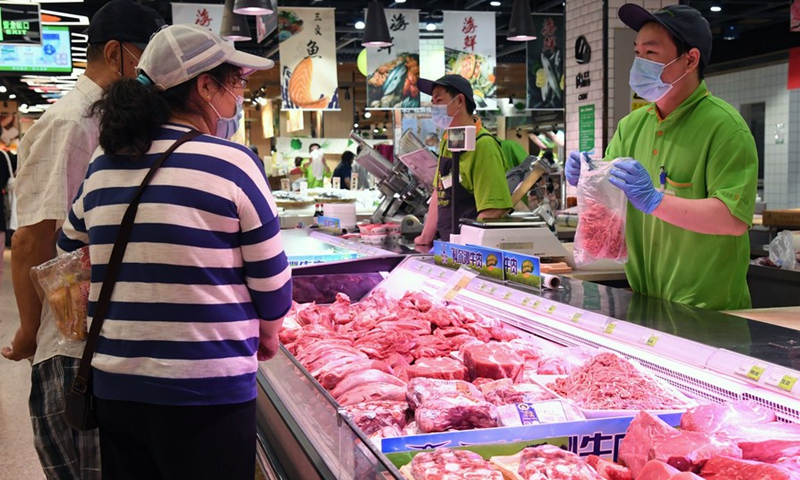Suspension of some meat imports from Brazil, UK won't have much impact
By Yin Yeping Source:Global Times Published: 2020/6/23 20:03:40
Suspension of some imports from Brazil, UK won't have much impact

Customers buy meat at a Chaoshifa supermarket branch in Haidian District of Beijing, capital of China, June 14, 2020. (Xinhua/Ren Chao)
The suspension of some meat imports from abroad is unlikely to seriously impact market supply in China, experts say, as a couple of meat processing factories in the UK and Brazil will halt exporting meat because of coronavirus infections there.
UK and Brazilian authorities informed China Customs that two companies -- UK-based pork provider Tulip and Brazil's beef supplier Agra -- had reported the suspension of all exports to China due to positive COVID-19 cases among their employees, China Customs' official WeChat account reported on Tuesday.
Officials in both countries said that they will continue to watch out for the health of their workers and provide information to China in a timely manner.
China imported about 6.18 million tons of meat last year, mainly from Brazil, European countries such as Spain and Germany, and the US, according to the China Meat Association (CMA).
The suspension involving the two companies is an important message from China on its quality requirements for all imported meat, Chinese experts say.
However, the import suspension of the two plants won't have much impact on market supply in China, the world's largest meat consumer, they say.
China's meat imports surged 50 percent last year, which only accounted for 8 percent of China's domestic market supplies, Gao Guan, deputy director of the CMA, told the Global Times on Tuesday.
"Imports from the two companies in Brazil and UK accounted for less than 1 percent of total meat consumption in China," Gao noted.
Chinese consumers are very flexible when it comes choosing alternatives or simply eating less meat, analysts said.
China imported 6.18 million tons of meat, and supply was down 8 million tons, leaving a gap of 2.5 million tons, but there was little market panic.
There are dozens of meat suppliers in Brazil alone, and China may also raise imports from other countries, including the US, as part of their phase one trade deal. Meat comprises a major portion of that deal, Gao said.
"Foreign trade is about reciprocity and fairness but safety is also a major issue, especially when the COVID-19 outbreak is spreading in many parts of the world," Ruan Zongze, executive vice president of the China Institute of International Studies, told the Global Times on Tuesday.
"We need to take responsibility for the safety of Chinese consumers."
Tyson Foods, which produces around 20 percent of the beef, pork and chicken in the US, has confirmed that of the 3,748 employees tested for COVID-19, 481 of them - or 13 percent - were positive. That finding led to China's suspension of imports from Tyson on Sunday.
Gao Feng, spokesperson of the Ministry of Commerce, said at a press conference on July 18 that increasing imports of food and agricultural products is an important part of China's proactive import policy. But these imports must comply with China's inspection and quarantine regulations.
"We will strengthen communication and coordination with relevant countries, control the quality and safety of imported food and agricultural products from the source, and ensure the health and safety of Chinese consumers," Gao said.
Analysts had expected meat imports to rise by 50 percent this year, but now that's unlikely because of the global pandemic.
"Some foreign companies will seek to raise prices if there's a reduction in meat supplies in China," Gao noted. "In addition to imports, China will need to strengthen meat production by making good use of its capacity advantages," said Gao.
Newspaper headline: Nation's meat supplies adequate
Posted in: ECONOMY,BIZ FOCUS,FEATURE